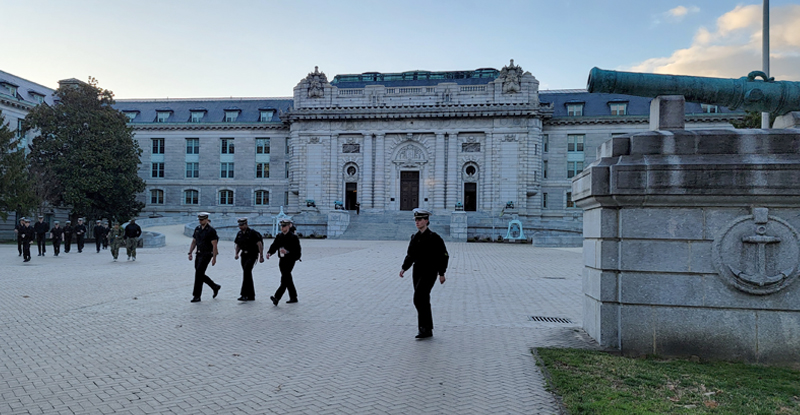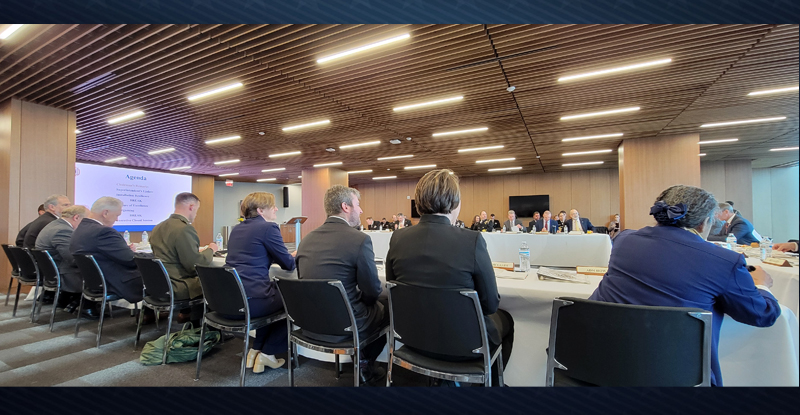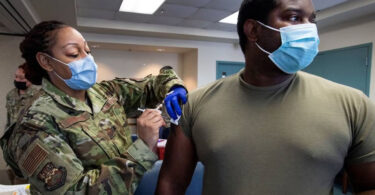This letter by a 1970 Naval Academy graduate, who was in the nuclear power industry, was written in November 2021 and circulated among his classmates, including a 4-star admiral and a former CEO of General Motors. They agreed with his facts and concerns. He also sent this to Naval Academy administration, the USNA Alumni Association President and Board of Visitors, but received no response. A view from a class president was the Naval Academy’s leadership were following orders and that alumni should always support the Academy no matter what. After this article, some comments about the Naval Academy public Board of Visitors meeting STARRS attended on Tuesday.
By G. Neil Midkiff, USNA ’70
Early this past September I attended my US Naval Academy 50th Reunion. I had missed the 45th and this one was delayed one year because of the Covid Pandemic. So, it had been 11 years since I had been to Annapolis, walked through the yard and had a chance to reflect on the changes that inevitably will occur in an institution such as a Service Academy.
The weather was perfect, the yard never looked more glorious and the new Copper roof on the Chapel Dome stood as a symbol of that long blue line of graduates who have served their country since 1845.
As now an “Old Grad”, it was more special than ever to catch up with so many of my Class of 1970. I suppose like at all military reunions, we told some sea stories, reminded ourselves of “back in the day” and for just a short while, were all young again. We had a great reunion.
But I left Annapolis profoundly troubled. I had learned that the Academy had changed in a very fundamental way.
I knew that the facilities, privileges and social opportunities for the Midshipmen had gotten much better over the years. I never had a problem with that, telling myself not to be one of the Old Grads talking about how tough it was when he was there.
The Academy has always stood on a bedrock of honor and accountability. Added to that is a very challenging academic, mental and physical environment which would accomplish its mission to “…to develop Midshipmen morally, mentally and physically and to imbue them with the highest ideals of duty, honor and loyalty…”
The Honor Code
I am troubled, first and foremost, over the Academy’s response to a massive cheating scandal that had occurred last December. 105 Midshipmen were found to have collaborated on a chat line or used outside unauthorized resources while taking a final Physics exam.
According to one news account,
“…breaking the school’s honor code, prompting further investigation. After that review, eighteen were separated; 82 were allowed to stay at the school but were sanctioned and put into a five-month honor remediation program. Four Midshipmen were cleared, and one is awaiting adjudication. The school did not disclose why some were punished more seriously than others.”
This was a much-discussed topic during our reunion. I heard from some of my classmates who attended the Superintendent’s alumni update briefing that he was challenged on this by some of the Alumni and defended it by saying the Midshipmen run the honor board and it was their decision.
I was shocked to hear that. Cheating on an exam is the clearest of honor code violations, even at civilian colleges and universities. And, until now there was only one result for a Midshipmen or Cadet at the other Service Academies, separation. However, the Academy has established an “honor remediation program”.
As an Alumni and former Naval Officer, I cannot understand let alone support this concept.
I wonder if the military establishment has changed so much that it has forgotten why we have a Naval Academy in the first place.
The Academy is there to produce the best and finest Naval and Marine Corps Officers to lead our Sailors and Marines. How does that match up with potential officers who require “honor remediation”?
Alcohol Abuse and Accountability
Later, I learned the Academy has still not gotten control of Midshipmen alcohol abuse, even with the new enforcement policies initiated as far back as 2006.
While waiting to leave that Sunday, I was sitting in the lobby of our B&B and got into a discussion with a new Plebe and the parents of a current First-Class midshipmen on life at the Academy. It was a very pleasant conversation, and I was much impressed with the new Plebe’s take on Plebe summer and her own motivation.
But then she brought up her disappointment with the alcohol abuse going on at the Academy. One of the parents joined right in on this. She said her daughter was very disappointed over the lack of enforcement of the regulations on drinking and it was not under control.
The Plebe continued to tell me that there is an ARI (Alcohol Related Incident) program to keep track of the offenses and, if a Company could have zero ARI’s for one month they would all get a free weekend.
She added that one of her Plebe Detail Squad Leaders had two ARI’s but still kept his position, and if the Academy wanted to really stop sexual harassment incidents it should crack down on the alcohol abuse.
When I got home, I did some research. News articles and a July 2020 Commandant of Midshipmen Instruction described the policy and very comprehensive program to assist Midshipmen with drug and alcohol problems.
Under age 21 drinking is not allowed and over age 21 is allowed but only within allowable breathalyzer results from random testing of Midshipmen returning from liberty.
Second-time offenders and those who register a level of .15 or above and repeat offenders can be disciplined through the academy’s conduct system, with punishments that could include expulsion.
In this case I reluctantly will be the Old Grad, objecting to what it seems to me to a serious lack of accountability at the Naval Academy.
My Youngster year the Academy had an unexpected increase in drinking abuses including drinking in the Hall. At the time, using alcohol in your room was a Class A Conduct Offense, meaning you could get by with one infraction.
To address the problem, the regulations were changed. One offense resulted in immediate expulsion. Drinking in the Hall literally stopped overnight. Having a beer in your room was not worth expulsion. If you took the risk, you would be held accountable.
From what I have read, and hearing a first-hand account that Sunday, I suggest that the comprehensive program and regulations on alcohol abuse is long on prevention and help and too short on accountability.
Everyone Passes
I had another revelation, which may be related to the concerns above. The Superintendent, at his briefing, announced that the class of 2019 graduated a record 91% of the entering Plebes (Freshmen).
The reason stated for this was the exceptional standards for admission, the candidates were more informed and prepared for the Academy, and that the new Academy executive culture (compared to our years) was to do everything they could to keep every midshipman rather than the “old way” of focusing on ways to weed them out.
This graduation rate is significantly historically higher for the Naval Academy. The 91% rate compares favorably to the top private universities such as the Ivy League where only very strong academically qualified candidates are selected.
My understanding is that the Naval Academy, like all the Service Academies, has always selected from the academic top tier as well, from before my generation until the present.
So, what changed the historical attrition rates of 25% or higher into the 1990’s to the current 10%?
One clear factor is the very low dropout rate during Plebe Summer. I remember a report from a few years back of only losing 12 Plebes one summer.
Another factor would be the benefit of the new Academic Center that provides for easily accessible extra help for any Midshipman. Just like the present, all classes historically have had very low academic attrition rates.
The change to a very low overall attrition rate then must be the result of much fewer loses for military aptitude or conduct, that of course doesn’t exist at Ivy League universities.
I would never support, in any way, going back to some of the severe physical and psychological practices or the social restrictions that we or other classes well into the 90’s had to endure. Needed reforms in those areas were made over the years and I had always believed that the Academy continued to be a tough place to make it through. And it would be incorrect to challenge the concept of new programs to help Midshipmen stay in school.
But I am concerned that in practice perhaps the main reason for the now low attrition rates is that Academy’s traditional high standards for military aptitude and conduct have changed, and not for the better.
How else can we explain an elite military institution where essentially everybody passes?
Alumni Leadership Experiences Not Welcome
I decided to put my concerns in writing and share with some of my classmates. I received validation from them as well additional accounts supporting my concerns. One in particular was very alarming.
In recent years the Academy instituted a program called the Capstone Leadership Seminars, where distinguished alumni could share their experiences in leadership with the Midshipmen.
My Class Pledge Fund has sponsored Capstone since 2006 and has raised over $480,000 in support. Many of my classmates have been guest speakers and been facilitators of the Capstone Seminars.
Despite this support. recently the current Academy Superintendent and Commandant banned the Class of 1970 from participating in the Capstone Program, stating we are out of touch.
Further, they have banned all classes that have less than ten years or more than 40 years from their graduations from participating.
My classmates justifiably have taken this edict as a great insult.
The classes of 70 and beyond are represented by many of the most significant military and civilian leaders in our country, including Admirals, Generals, CEOs and members of Congress.
These classes have also been reliable and large donors to the Naval Academy Foundation and other funding requests.
This sends a message that the current Naval Academy Administration values their senior graduates only for their financial support, not for their expertise or their service to the country.
But it also is most alarming to me that this elimination of input from the senior alumni may be designed to help shield the Administration from criticism and challenges to their current leadership standards and accountability like I have described in this account.
About the Author
Neil Midkiff is a retired Commercial Nuclear Power Executive with a forty-year career in the US and international electrical utility industry. His career included management positions at operating and new construction nuclear power plants and as a management consultant with major consultancies including Accenture, Booz Allen and Hamilton and Rolls Royce. His clients also included the US Department of Energy and the US Department of Defense.
His last position was as the Director of Nuclear Oversight for the Barakah Nuclear Power Plant in the United Arab Emirates, where he served as an independent executive ensuring compliance with international safety regulations and industry standards in preparation for the startup of the first nuclear power plant in the Mideast.
Neil is a 1970 graduate of the United States Naval Academy and, following nuclear power training, served on two nuclear submarines during the Cold War. His first ship was the attack submarine USS Jack where he was the Communications Officer. While serving on Jack he completed a six-month deployment to the Mediterranean. Following graduation from the Advanced Submarine Officer’s Course, he then served on the Fleet Ballistic Submarine USS Lafayette as the Main Propulsion Assistant, where he received a commendation from the Commander, Submarine Forces Atlantic for his leadership during an extensive overhaul. Following his tour on Lafayette, Neil resigned his commission, and maintained the rank of Lieutenant in the inactive US Naval Reserve.
Neil has a Master’s in Business Administration from Loyola College in Maryland. His past professional certifications include a Senior Reactor Operator License with the U.S. Nuclear Regulatory Commission, Registered Professional Engineer with the State of Virginia and a Certified Health Physicist with the American Board of Health Physics.
Neil’s additional comment: The commercial nuclear power industry in the US would never have been feasible except for the nuclear navy. That pipeline fed the industry with experienced and qualified staff and managers that operated and managed every nuclear plant in the country.
Former nuclear navy officers who were also Academy grads were a very close group and I was extremely proud to be part of the group for 40 years.
The reason this was so important was we were trusted to always do the right thing and never lose sight of our focus on nuclear safety. They were my colleagues and clients for all those years, and I never doubted our common bond.
When I think of what the Academy is turning out now I sadly have to wonder if all of them would meet the same standards?
STARRS attended the 19 March 2024 Naval Academy public Board of Visitors meeting with members of the Calvert Task Group.
Like the West Point public Board of Visitors meeting, both seemed impressive, controlled ‘dog and pony shows’ where they only talk about how great everything is, but asked for funding for infrastructure. Some members of the BOV for the Naval Academy asked more questions than the WP BOV, but nothing in-depth about difficult issues. Not sure what exactly the point of these meetings are except to get buy-in and support from Congress.
Regarding the issue of abuse of alcohol stated in the above article, the Commandant mentioned working with midshipmen to help them to deal ‘maturely’ with the use of alcohol, ‘considering there are so many bars right outside the gates’. Also there is a “Midshipmen Preservation Council” which works to get mids mental health help on a number of issues before it gets bad.
The new Superintendent stated her three main priorities were:
1) Dignity & Respect in terms of doing a “sea change of culture” to prevent sexual assault;
2) Culture of Excellence in terms of getting mids ready now for the mission (also the Navy apparently just released a “Culture of Excellence 2.0“); and
3) Resilience in infrastructure in terms of building up the seawall to prevent severe flooding of the campus.
This was similar to the three priorities the USAFA Superintendent told to a visiting group of Miss American candidates
- developing leaders of character
- preparing for future conflict
- dignity and respect for all
His big “cultural change” for the Academy is the Let’s Be Clear campaign to prevent sexual assault.
It’s odd that military academy superintendents have to have this as a main priority instead of focusing on what a military academy is for, producing warfighters to lead the military. Why is this such an ongoing issue and when did this distraction start?
Another item touted was that 44% of the applicants were minorities and 32% were females.
First female Naval Academy superintendent says curbing sexual harassment is her top priority (Baltimore Banner, 22 March 2024)









Leave a Comment